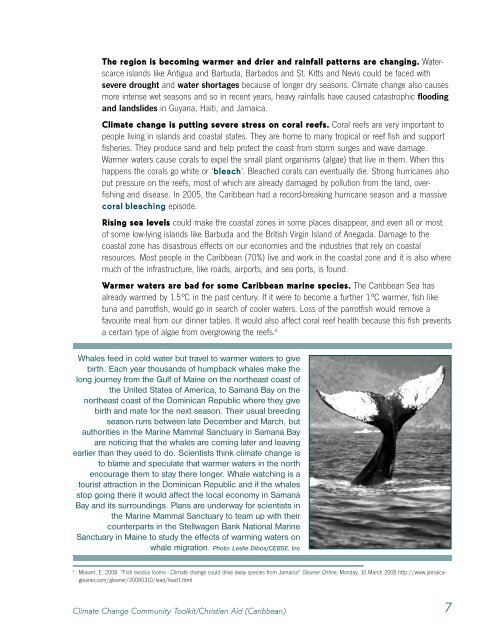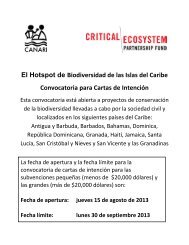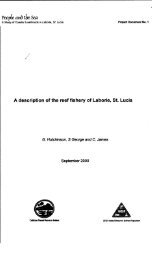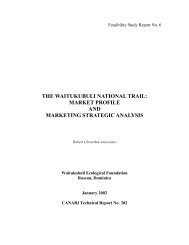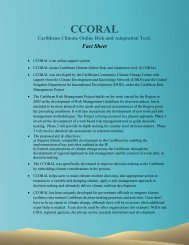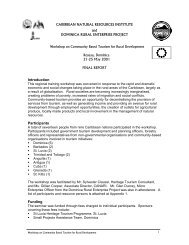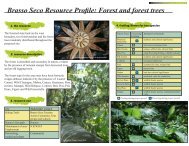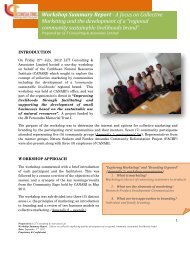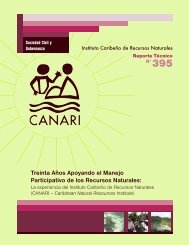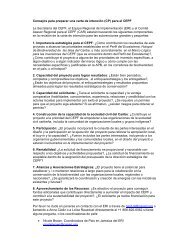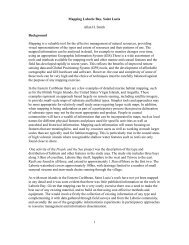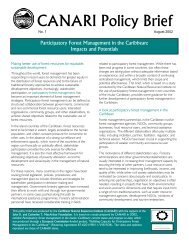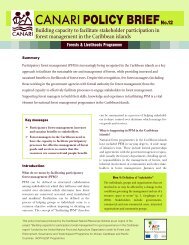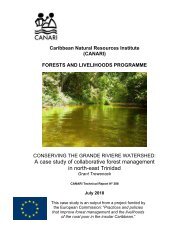Addressing Climate Change in the Caribbean: A Toolkit ... - CANARI
Addressing Climate Change in the Caribbean: A Toolkit ... - CANARI
Addressing Climate Change in the Caribbean: A Toolkit ... - CANARI
Create successful ePaper yourself
Turn your PDF publications into a flip-book with our unique Google optimized e-Paper software.
The region is becom<strong>in</strong>g warmer and drier and ra<strong>in</strong>fall patterns are chang<strong>in</strong>g. Waterscarce<br />
islands like Antigua and Barbuda, Barbados and St. Kitts and Nevis could be faced with<br />
severe drought and water shortages because of longer dry seasons. <strong>Climate</strong> change also causes<br />
more <strong>in</strong>tense wet seasons and so <strong>in</strong> recent years, heavy ra<strong>in</strong>falls have caused catastrophic flood<strong>in</strong>g<br />
and landslides <strong>in</strong> Guyana, Haiti, and Jamaica.<br />
<strong>Climate</strong> change is putt<strong>in</strong>g severe stress on coral reefs. Coral reefs are very important to<br />
people liv<strong>in</strong>g <strong>in</strong> islands and coastal states. They are home to many tropical or reef fish and support<br />
fisheries. They produce sand and help protect <strong>the</strong> coast from storm surges and wave damage.<br />
Warmer waters cause corals to expel <strong>the</strong> small plant organisms (algae) that live <strong>in</strong> <strong>the</strong>m. When this<br />
happens <strong>the</strong> corals go white or ‘bleach’. Bleached corals can eventually die. Strong hurricanes also<br />
put pressure on <strong>the</strong> reefs, most of which are already damaged by pollution from <strong>the</strong> land, overfish<strong>in</strong>g<br />
and disease. In 2005, <strong>the</strong> <strong>Caribbean</strong> had a record-break<strong>in</strong>g hurricane season and a massive<br />
coral bleach<strong>in</strong>g episode.<br />
Ris<strong>in</strong>g sea levels could make <strong>the</strong> coastal zones <strong>in</strong> some places disappear, and even all or most<br />
of some low-ly<strong>in</strong>g islands like Barbuda and <strong>the</strong> British Virg<strong>in</strong> Island of Anegada. Damage to <strong>the</strong><br />
coastal zone has disastrous effects on our economies and <strong>the</strong> <strong>in</strong>dustries that rely on coastal<br />
resources. Most people <strong>in</strong> <strong>the</strong> <strong>Caribbean</strong> (70%) live and work <strong>in</strong> <strong>the</strong> coastal zone and it is also where<br />
much of <strong>the</strong> <strong>in</strong>frastructure, like roads, airports, and sea ports, is found.<br />
Warmer waters are bad for some <strong>Caribbean</strong> mar<strong>in</strong>e species. The <strong>Caribbean</strong> Sea has<br />
already warmed by 1.5°C <strong>in</strong> <strong>the</strong> past century. If it were to become a fur<strong>the</strong>r 1°C warmer, fish like<br />
tuna and parrotfish, would go <strong>in</strong> search of cooler waters. Loss of <strong>the</strong> parrotfish would remove a<br />
favourite meal from our d<strong>in</strong>ner tables. It would also affect coral reef health because this fish prevents<br />
a certa<strong>in</strong> type of algae from overgrow<strong>in</strong>g <strong>the</strong> reefs. 8<br />
Whales feed <strong>in</strong> cold water but travel to warmer waters to give<br />
birth. Each year thousands of humpback whales make <strong>the</strong><br />
long journey from <strong>the</strong> Gulf of Ma<strong>in</strong>e on <strong>the</strong> nor<strong>the</strong>ast coast of<br />
<strong>the</strong> United States of America, to Samaná Bay on <strong>the</strong><br />
nor<strong>the</strong>ast coast of <strong>the</strong> Dom<strong>in</strong>ican Republic where <strong>the</strong>y give<br />
birth and mate for <strong>the</strong> next season. Their usual breed<strong>in</strong>g<br />
season runs between late December and March, but<br />
authorities <strong>in</strong> <strong>the</strong> Mar<strong>in</strong>e Mammal Sanctuary <strong>in</strong> Samaná Bay<br />
are notic<strong>in</strong>g that <strong>the</strong> whales are com<strong>in</strong>g later and leav<strong>in</strong>g<br />
earlier than <strong>the</strong>y used to do. Scientists th<strong>in</strong>k climate change is<br />
to blame and speculate that warmer waters <strong>in</strong> <strong>the</strong> north<br />
encourage <strong>the</strong>m to stay <strong>the</strong>re longer. Whale watch<strong>in</strong>g is a<br />
tourist attraction <strong>in</strong> <strong>the</strong> Dom<strong>in</strong>ican Republic and if <strong>the</strong> whales<br />
stop go<strong>in</strong>g <strong>the</strong>re it would affect <strong>the</strong> local economy <strong>in</strong> Samaná<br />
Bay and its surround<strong>in</strong>gs. Plans are underway for scientists <strong>in</strong><br />
<strong>the</strong> Mar<strong>in</strong>e Mammal Sanctuary to team up with <strong>the</strong>ir<br />
counterparts <strong>in</strong> <strong>the</strong> Stellwagen Bank National Mar<strong>in</strong>e<br />
Sanctuary <strong>in</strong> Ma<strong>in</strong>e to study <strong>the</strong> effects of warm<strong>in</strong>g waters on<br />
whale migration. Photo: Leslie Dibos/CEBSE, Inc<br />
8<br />
Moxam, E. 2008. “Fish exodus looms - <strong>Climate</strong> change could drive away species from Jamaica” Gleaner Onl<strong>in</strong>e, Monday, 10 March 2008 http://www.jamaicagleaner.com/gleaner/20080310/lead/lead1.html<br />
<strong>Climate</strong> <strong>Change</strong> Community <strong>Toolkit</strong>/Christian Aid (<strong>Caribbean</strong>) 7


